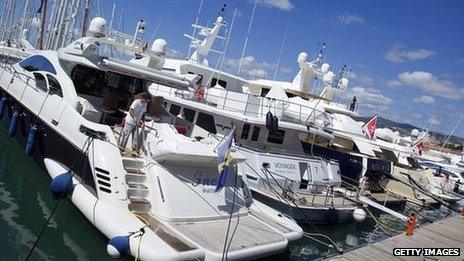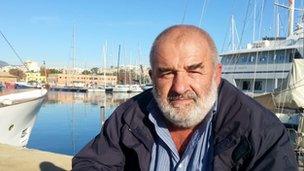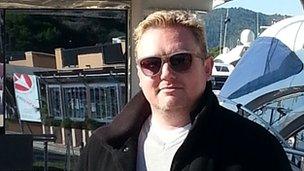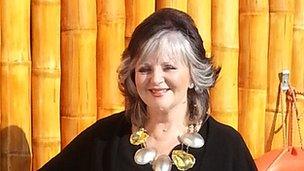Is niche internet television broadcasting the future?
- Published

December in Mallorca is a relatively quiet time. While the sun still glitters on the deep blue waters of Palma harbour, the tourists who throng the island's resorts in summer are nowhere to be seen.
Yet the marina here is still busy, its piers teeming with hundreds of motor cruisers and yachts that need to be looked after until the next holiday season comes around and their wealthy owners return.
For Jason Wilkinson, a 41-year-old expatriate Briton, those boats and the industry that has grown up around them represented an ideal business opportunity.
In 2010, he established Nautical Television Europe (NTVE), an internet-based television station aimed at the yachting set and those who look after them.
It is an example of a growing trend in the digital age - the niche broadcaster.
"NTVE is aimed at companies which work in the super-yacht industry, as well as people who are interested in the lifestyle," he says.
"Yachting here in the Balearics is a huge part of the islands' economy. Even the smaller yachts will have four or five full-time staff working aboard.
"The bigger ones can have 30 people on them all year round. They live here, they have families here. It's a significant industry."
It is fertile territory for NTVE's programming, which focuses heavily on the latest designs and technology in the sector, as well as broadcasting from events such as the annual Monaco yacht show in Monte Carlo.
New level
Niche broadcasting is not new. Any fan of cable TV, for example, will be well aware of the kind of obscure and esoteric material that can be found hidden deep within the channel list.
But IPTV, or internet protocol television, has the potential to take niche broadcasting to a new level, because it can be produced and broadcast very cheaply and accessed by audiences around the world for nothing.
The big question is whether or not channels run in this way can be profitable. Peter Preston, a columnist for the Guardian and the Observer, thinks they can.

Sponsoring a documentary has clear benefits, says marina owner Oscar Siches
"If you can say, I'm doing a niche channel for lovers of steam trains or lovers of new training shoes or whatever, then that's not too far removed from the way standard television, with its 250 to 300 channels, is performing.
"If you can do that more economically on the net, with advertising totally geared to the product you're selling, then that's a clear economic model and I'd expect it to be exploited," he says.
How such channels raise their money is also important. NTVE is funded largely through sponsored programming and product placement, rather than direct advertising.
Among Mr Wilkinson's clients is Oscar Siches, who runs Amarres Deportivos, a company that operates two upmarket marinas on the island.
They are the kind of places frequented by business leaders, captains of industry and the odd ageing rock star.
Despite the deep recession that has hurt mainland Spain so badly, it is clear there is still plenty of money washing around the Balearics.
"This is a beautiful boat, I would call it a floating Rolls-Royce," says Mr Siches, pointing out a sleek, blue two-masted sailing vessel with a carved wooden stern moored on the quayside of his Moll Vell marina in Palma.
"It's from a very, very good shipyard in Holland, Huisman.
"It's a beautiful showcase of craftsmanship. If you wanted to build up this boat today, it would cost you £35m to £40m."

The economics of programme-making have been transformed, says Jason Wilkinson
Oscar is in the process of rebuilding and refurbishing his marinas and is paying NTVE to film the entire process.
The result is a documentary series in which he himself figures prominently. He says the benefits are clear.
"Obviously, I like to show my clients and potential clients what we are doing with the marina.
"And what I really love is just to share experiences, show people what they don't know, and perhaps let them see another side of the marina and yacht harbour business that they wouldn't know if somebody didn't tell them."
'It raises awareness'
The market for NTVE is clearly defined, but last year, Mr Wilkinson decided to launch a second channel - Mallorca Today TV.
It is an English-language lifestyle channel, aimed mainly at holidaymakers and expatriates on the Spanish-speaking island.
Much of its output is produced in a tiny studio hidden away in the tourist village of Magaluf, a place best known for the alcohol-fuelled excesses of some of its summer visitors.

The internet programmes offer good value, says Margaret Whittaker
Programming includes regular features on golf, property investment and cooking.
The channel does carry commercials, but as with NTVE, most of its revenue comes from sponsored programming and product placement.
Its cookery feature, Island Kitchen, is paid for and hosted by Mood Beach, a beach club near Palma run by entrepreneur Margaret Whittaker.
Ms Whittaker, founder of dieting firm Slimming World, now owns a number of businesses on Mallorca and says the coverage offers good value.
"It's a super service for us. It certainly raises awareness," she says.
"Now people who come here can see the programme anywhere in the world, on demand. It's really exciting."
Mr Wilkinson admits that his audience is relatively tiny. He says it amounts to a few thousand daily viewers for each channel.
But crucially, it is not limited by geography, so there is plenty of room for growth.
"If we were a conventional broadcaster, it would have been impossible, purely because of the costs involved.
"We need a worldwide audience. We might only get 0.0001% of the global audience, but that alone would be far more than we could get if we were confined to a single region.
"It couldn't happen just locally."
You can hear more on this story in World Business Report on BBC World Service at 17:32, 19:32 and 22:32 GMT on Friday 3 January 2014.